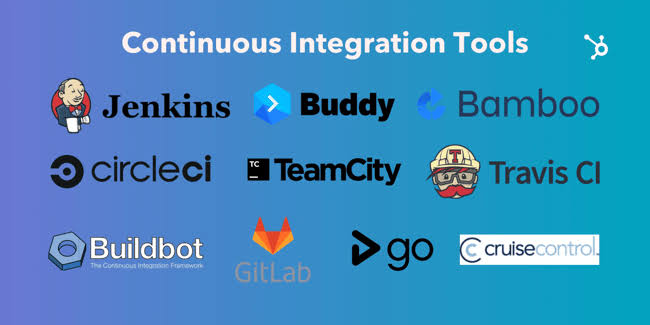In todays software development landscape Continuous Integration (CI) plays a role, in the DevOps approach. It entails frequently combining code modifications into a repository where automated builds and tests take place. This method helps identify integration problems ensuring software releases. To facilitate efficient CI a variety of DevOps tools exist to simplify and improve the integration process. In this article we delve into the ten most popular DevOps tools utilized for Continuous Integration.
1. Jenkins
Jenkins is a widely used open source CI tool recognized for its adaptability and vast plugin ecosystem. It empowers developers to streamline the processes of building, testing and deploying applications. With a range of plugins available Jenkins seamlessly integrates with different tools, version control systems and deployment platforms. Its architecture allows for customization making it a fit for projects of sizes.
2. Travis CI
Travis CI is a cloud based continuous integration tool that works well with GitHub repositories. Its purpose is to streamline the process of testing and deploying code changes with setup. Travis CI supports programming languages and offers comprehensive build logs and reports. Developers favor it for its user friendly interface and close integration, with GitHub when seeking a simple CI solution.
3. CircleCI
CircleCI is a robust continuous integration tool that provides hosted and self hosted solutions. With a focus on speed and efficiency it offers features like parallelism and caching to expedite the build process. CircleCI seamlessly integrates with a variety of development tools and services facilitating smooth workflows from code commit to deployment. Its intuitive interface and comprehensive insights into build performance make it a valuable asset for development teams.
4. GitLab CI/CD
GitLab CI/CD is an all in one DevOps platform that boasts powerful CI/CD features. Seamlessly integrated with GitLab's version control system it offers a cohesive experience for code management and deployments. With GitLab CI/CD you can set up pipelines that automate building, testing and deploying your code. The platform also includes monitoring and reporting tools that provide insights into the CI process enabling teams to streamline their workflows effectively.
5. Bamboo
Bamboo, created by Atlassian, is a tool that seamlessly works with Atlassian products like Jira and Bitbucket. It provides capabilities for automating building and deployment tasks across programming languages and frameworks. With its ability to handle builds, deployment projects and environment setups Bamboo offers a versatile option for teams seeking a robust CI solution.
6. TeamCity
TeamCity, created by JetBrains is a continuous integration (CI) tool recognized for its user friendliness and robust integration features. It accommodates a variety of tools, version control systems and deployment platforms. TeamCity provides functionalities like chains, build artifact dependencies and comprehensive build tracking. With its interface and wide range of customization options it's a favored option among teams looking for a flexible CI solution.
7. Azure DevOps
Azure DevOps, formerly referred to as Visual Studio Team Services, is a cloud based DevOps platform offered by Microsoft. It provides a range of tools for continuous integration and deployment (CI/CD), project management and team collaboration. Azure DevOps presents a CI solution with functionalities, like build pipelines, release management and seamless integration with Azure cloud services. Its compatibility with Microsoft tools and services positions it as an option for teams operating within the Azure ecosystem.
8. Jenkins X
Jenkins X is a version of Jenkins tailored, for Kubernetes and applications. It offers a user experience, in continuous integration and deployment (CI/CD) for environments by incorporating support for Kubernetes, Helm and GitOps. With Jenkins X the process of setting up CI/CD pipelines becomes automated and deploying applications to Kubernetes clusters is simplified. Its emphasis on technologies positions it as a tool, for contemporary development methodologies.
9. Buildkite
Buildkite is a CI tool that blends the freedom of self hosted agents with the ease of cloud based management. It enables developers to execute builds on their infrastructure while utilizing Buildkite's cloud platform for overseeing and tracking the build process. With support for builds and distribution Buildkite offers scalability and oversight throughout the CI workflow. Its capability to integrate with an array of development tools and services positions it as a flexible option for teams with tailored infrastructure requirements.
10. CodeShip
CodeShip is a cloud based continuous integration tool that prioritizes simplicity and user friendliness. It supports both basic and advanced CI/CD workflows offering features like builds, deployment pipelines and environment management. CodeShip seamlessly integrates with version control systems and deployment platforms providing a smooth process for handling code updates and deployments. Its interface and quick setup make it an appealing choice for teams looking for a straightforward CI solution.
In summary the choice of a CI tool can have an impact, on the efficiency and effectiveness of the development workflow. Each of the leading DevOps tools such as Jenkins, Travis CI, CircleCI, GitLab CI/CD, Bamboo, TeamCity, Azure DevOps, Jenkins X, Buildkite and CodeShip offers features and capabilities tailored to different needs and preferences. By recognizing the strengths of each tool and aligning them with your teams requirements you can improve your continuous integration process and promote more reliable software development practices.
